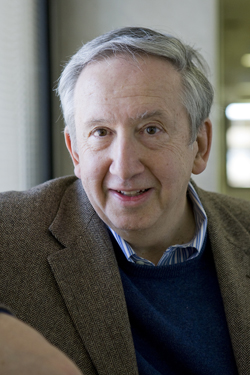The prince and the pauper: a new twist
|
“If you are the CEO of a bank, you get shown the money; if you’re the CEO of an auto company, you get shown the door.” That’s the sentiment voiced by many Americans in response to the financial bailout of banks and insurers. And when legal experts, in defense of the bank bailouts, cited the importance of upholding the contractual agreements of those in the financial industry, some wondered, “What about the employment contracts of the people who take their showers after work?” This double standard is what Temple History Professor Peter Gran sees when he looks at modern world history. Gran’s attempt to deal with the narrative of who has political and economic power in the world is outlined in his provocative new book, The Rise of the Rich: A New View of Modern World History (Syracuse University Press, 2009). “If you follow the trail and look at who AIG paid off with the money they received from our government bailout, you can see that European banks take precedent over ordinary Americans. If you watch how this rescue is playing out, you can see who is getting the life boats,” he said. |
 Photo by Joseph V. Labolito/Temple University
Gran
|
|
In The Rise of the Rich, Gran challenges the long-accepted paradigm — the Rise of the West — as a means of understanding world history. He asks that we rethink the traditional Eurocentric approach which exaggerates the importance of all things Western at the expense of the Third World. “While some world historians have sought to create a world history that is more inclusive of Third World countries, they still rely on the old ways of thinking, even as they move Africa or Asia toward the center,” said Gran. “My current book begins with the observation that the traditional story of the Rise of the West — the one we’ve been taught for generations — places too much weight on all people of the so-called West and too little on the ruling classes and power centers around the globe,” he said. In his book, Gran attempts to reframe current historical debates by presenting a model of analysis based on the rise of the ruling classes. Instead of a history of clashing civilizations, he identifies a history of resolving conflict through negotiations and collaborations among the wealthy across geographical regions. “We can see the rise of the rich play out today, for example, in the role of foreign lobbyists. The fact that anybody of influence can hire a foreign lobbyist to protect their interests in Washington shows where power is in the world,” he noted. In his research, Gran found that the rise of modern capitalism rested on collaboration among the ruling classes throughout the world. “Without such collaborations there would have been no overseas markets for early capitalists to sell to or expand into and no organized arena for plunder,” Gran said. According to Gran, by the eighteenth century, more and more ruling classes from around the world, in countries such as Egypt and India, followed a course of strategic consumerism. They found it in their interest to buy new-style goods made in Western Europe as part of their foreign policy. Thus, they would take the raw goods previously turned over to local artisans, sell those raw goods to Europe and then buy the finished goods from Europe, for political reasons. “This had the effect of securing an alliance among the ruling classes and creating an economic crisis for the urban masses,” said Gran. “By the early nineteenth century, Indian textile workers, like Egyptian artisans, found themselves unemployed while the rulers were living a life of luxury.” As an expert in modern Egyptian history, who has also spent a great deal of time living there, Gran says that his experiences in the Middle East provide him with a unique vantage point. “Egypt has not been sleeping,” he noted. “One clearly sees a local dominant class which has international influence,” said Gran. “A tour of historic homes of dominant individuals from the seventeenth through the nineteenth centuries gives an impression of how they lived. This perspective should be included when we think about world history today.” Gran is a professor of History, in the College of Liberal Arts. |
|